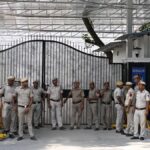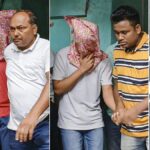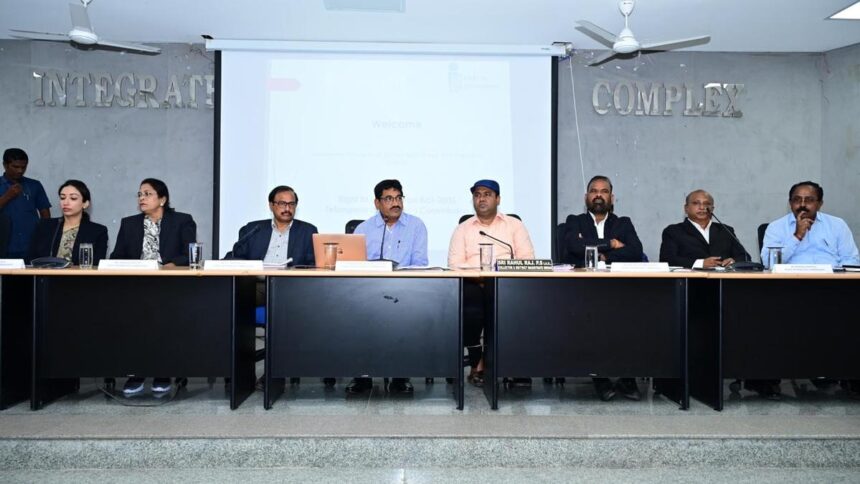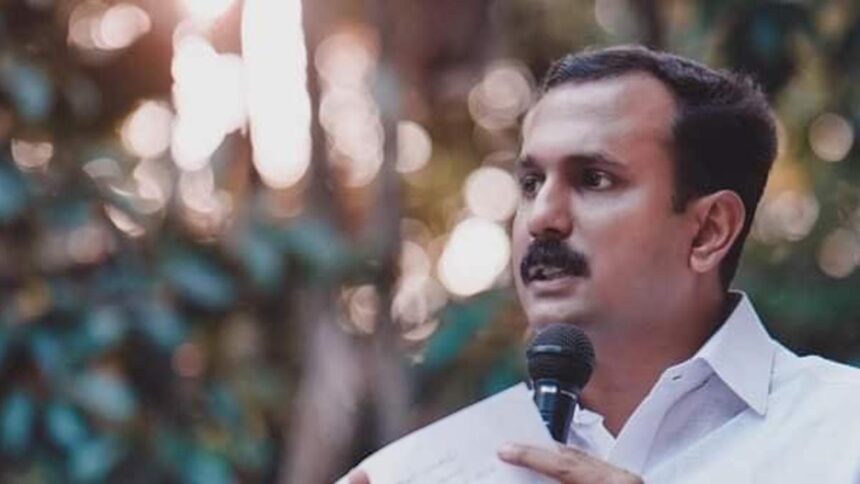When B. Malathi, 52, waved goodbye to her son B. Ajith Kumar on June 27, she did not know that it was the last time she was seeing him alive. On June 29, she held her eldest son’s bruised dead body close to her. By the evening of June 28, the dramatic events that unfolded in a remote hamlet, called Madapuram, in Tirupuvanam taluk of Sivaganga district triggered public outcry against the systematic custodial torture by the police. Ajith Kumar was a security guard on contract at the Adaikalam Katha Ayyanar Matrum Badrakaliamman Temple at Madapuram. It all started after a woman, named J.P. Nikitha, of Tirumangalam in Madurai district made a complaint against Ajith Kumar for allegedly stealing her gold ornaments which she claimed were kept in her car. Nikitha and her mother J. Sivagami Ammal visited the temple on Friday morning. They had then given the key of the car to Ajith Kumar to park the vehicle. As he did not know driving, Ajith Kumar asked his friend Arun, an autorickshaw driver, to park the car. When the mother and the daughter returned, they took the key from Ajith Kumar and drove away.
Within an hour, they returned to the temple and questioned Ajith Kumar about the 10-sovereign gold ornaments which they claimed were kept in a bag in the car and were now missing. When he denied taking any of the items kept in the car, Ms. Nikitha informed the temple administration and the Tirupuvanam police station. A temple worker took Ajith Kumar to the police station, where the first phase of investigation began. Later, he was taken in a police vehicle to various places. All this happened without any official mention in police records.
Probe without FIR
According to Henri Tiphagne, founder and executive director of the Madurai-based human rights organisation People’s Watch, who represented one of the petitioners before the Madurai Bench of Madras High Court, the entire course of investigation was orchestrated by the special team comprising six policemen. It had taken place without even a First Information Report (FIR) being registered. The police registered an FIR only the next day after taking Ajith Kumar into custody, he adds.
The first night of police custody was crucial as Ajith Kumar suffered most of the injuries when he was taken to different places such as the veterinary hospital, an Adi Dravidar Welfare Department hostel, a waterbody, and a private farm, Mr. Tiphagne says. The next day, B. Naveen Kumar, 27, the younger brother of the victim, says he, along with Arun and C. Vinoth alias Natarajan, was called by the police for another round of investigation. Following a brief inquiry, they were let off, while Ajith Kumar was kept in custody, Naveen Kumar adds. “Unable to bear the pain and to save himself from further assault and also to draw public attention in the belief that someone would save him, my brother told the police that the ornaments were kept in a location behind the temple,” he recalls.
Subsequently, the police took him to the location; but, as they could not find anything there, they were furious and took him to a secluded place behind the office of the Assistant Commissioner of the Hindu Religious and Charitable Endowments Department adjacent to the temple. Eyewitnesses at the temple, who were also co-workers of Ajith Kumar, say they heard him scream in pain from the thrashing he received. According to the workers and the priests, they were helpless as they could not interfere for two reasons: both entrances to the secluded area were closed by the police and they did not have the courage to question the police fearing that they would unleash the same degree of violence on them.
A. Bhagyalakshmi (name changed), one of the temple workers, was on duty the day Ajith Kumar was tortured. She says, “As the alleged theft is said to have happened on Friday, none of the workers paid attention to it because it was a busy day.” They knew that Ajith Kumar was sent to the police station on Friday evening, along with a temple worker, and an investigation was under way. “We thought that the investigation was normal as the police would have suspected that he might have seen something,” she recalls. But when the investigation continued for the second day and things turned ugly, they realised that something was amiss.
One of the shopkeepers outside the temple, who had employed Ajith Kumar once, saw some people helping an “unsteady” Ajith Kumar out of the temple office and putting him in an autorickshaw. The shopkeeper said Ajith Kumar’s head hung unsteadily and his face bore blood stains. As the other vendors too saw Ajith Kumar, the police shooed the autorickshaw away, the shopkeeper says. A close relative of Ajith Kumar said he was asked by the police to buy chilli powder and water from a nearby shop. According to a source at the Government Rajaji Hospital, the dead body had traces of chilli powder on the face, private parts, and bowel. “The body had 44 external injuries, several internal injuries, and old cigarette burn marks,” according to the post-mortem report.
Blunt injuries
Karunakaran Mathiharan, forensic expert and former professor of Forensic Unit, University of Malaya, Kuala Lumpur, has co-authored a book, named Medical Jurisprudence and Toxicology. He says the post-mortem report reveals that haemorrhage and blunt injuries on multiple spots were among the causes of death. “Another major reason could be traumatic rhabdomyolysis, a condition characterised predominantly by increased creatinine phosphokinase (CPK) value, which can cause acute kidney damage or injury,” he adds. Incidentally, the same condition was noted in the post-mortem reports of Sattankulam custodial death victims P. Jayaraj and J. Benicks, he recalls.
When a muscle suffers repeated heavy blows, myoglobin, a protein found in muscle tissue that binds and stores oxygen, is released into the bloodstream. The release of myoglobin acts as a poison, Dr. Mathiharan says, and it will result in renal failure.
The delay in handing over the post-mortem report to the Judicial Magistrate went against the direction of the Madurai Bench of the Madras High Court in a 2020 case. Justices N. Kirubakaran and S.S. Sundar decreed in 2020: “The doctors shall follow Article 621 of the Tamil Nadu Medical Code by sending the post-mortem certificate as soon as it [the post-mortem] is over to the Judicial Magistrate and send a copy to the Head of the Department on the same day, failing which departmental proceedings shall be initiated against them.”
To avoid discrepancies and delays in the autopsy report, the court suggested a centralised web-enabled software, called ‘Medico Legal Examination and Post-Mortem Reports Systems’ (MedLeaPR). It pointed to the Punjab and Haryana High Court’s order, dated March 29, 2012, directing the States to submit only computer-generated Medical Legal Report and Post-mortem Report. “Based on it, the State governments, with the help of the Postgraduate Institute of Medical Education and Research (PGIMER), developed the software,” according to a forensic expert.
Mr. Tiphagne, however, is confident that the post-mortem report is a just supporting document now because many of the eyewitnesses have come out in support of the victim.
A video of the assault has also gone viral. A temple staffer had recorded one of the videos from the temple bathroom, but a number of people had seen the police unleash violence on Ajith Kumar at various places in the village. They have given their statements to IV Additional District Judge (Madurai) S. John Sundarlal Suresh, who has been conducting an inquiry based on the High Court’s direction.
‘Ganja administered’
Manojbabu, a relative of Ajith Kumar, has alleged that the police administered ganja to the victim during the course of investigation. “During the brief interaction I had with Ajith Kumar near the temple, he reeked of ganja. I am sure he didn’t use ganja.”
According to the police and advocates, it has emerged that most of the objects used to attack Ajith Kumar have been removed. A Division Bench of Justices S.M. Subramaniam and A.D. Maria Clete of the Madurai Bench, while hearing a batch of public interest litigation petitions in the custodial death case, observed that it was brought to their notice that some pieces of evidence had already been destroyed and the scene of occurrence was not properly preserved. It was said Additional Deputy Superintendent of Police Sukumaran went to the scene of crime and collected the pieces of evidence in gunny bags in an unusual manner, the court observed.
Kathir, founder of the NGO Evidence, visited the spots along with witnesses. He says such a violent treatment of a suspect in a theft case is unheard of. “The police in plainclothes, handling a member of the public brutally, is terrifying and shocking.” Though six policemen were suspended and five were arrested, the speed at which action was taken raised doubts about higher officials being behind such an unlawful act, he adds.
A place of ignominy: The secluded place adjacent to the temple where Ajith Kumar was tortured. Eyewitnesses at the temple say they heard him scream in pain from the thrashing he received.
| Photo Credit:
L. BALACHANDAR
Mr. Kathir says that while Sivaganga Superintendent of Police Ashish Rawat was put on the compulsory waiting list and Manamadurai Deputy Superintendent of Police N. Shanmugasundaram was suspended, the person who allegedly directed these officials has not come under investigation so far.
Mr. Tiphagne says, “The idea behind command responsibility is that whether or not the subordinate is held accountable for the actual commission of a criminal act, the superior [the commander] should bear personal responsibility for having instigated or condoned the act.”
‘Indefinite delay likely’
Despite Chief Minister M.K. Stalin ordering the transfer of the investigation to the CBI, he feels the higher official who had passed the actual order for investigation will be left untouched. While the transfer of the case itself would cause delays and compromise the investigation, owing to the official’s alleged links with the Union government, the CBI taking over the case could lead be an indefinite delay in completing the probe. “As the case pertains to only a small area, a senior police official with a clean record could be appointed for the investigation,” he suggests.
At Madapuram, Malathi sits before the portrait of her son. She knows no monetary compensation could replace him. Though the government promptly acted against the offenders, the ruling DMK’s local office-bearers, along with the Manadamadurai DSP, held a meeting with the family to strike a compromise. A sum of ₹50 lakh was offered to the family, according to the petitioners. The government gave the family ₹5 lakh in compensation and Naveen Kumar a government job.
Custodial deaths since 2021
According to the data collected by People’s Watch, since the DMK was elected to power in 2021, a total of 31 deaths have occurred in Tamil Nadu owing to police torture in custody. Furthermore, no police officer has been convicted for the custodial deaths between 2017 and 2022.
(With inputs from B. Tilak Chandar)





















